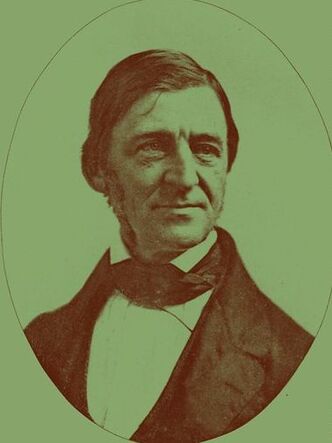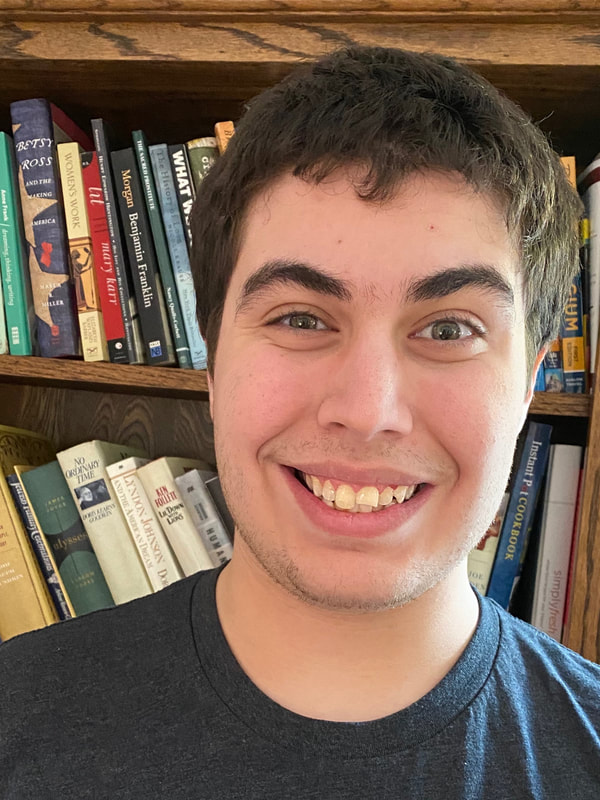- Folio No. 9
- About
- Feral Parrot : The Blog
- INTERVIEWS
- SUBMISSIONS
-
ISSUE ARCHIVE
- PRINT Chapbook No.6 Healing Arts
- Online Issue No.9
- Online Issue No.1 Fall 2016
- Online Issue No.2 Spring 2017
- ONLINE Issue No.3 Fall 2017
- PRINT Vol 72 No 2 Fall 2017
- PRINT Vol 73 No.1 Fall 2018
- ONLINE Issue No. 4 Fall 2018
- Online Issue No.5 Summer 2018
- FOLIO No.1 Fall 2018 VOTE
- ONLINE Issue No.6 Fall 2018 Fall Spirituality
- FOLIO 2 Fall 2019 Celebrating Dia De Los Muertos
- FOLIO No.3 -- Moon Moon Spring 2019
- FOLIO No.4 Celebrating New PCC Writers
- FOLIO No.5 City of Redemption
- FOLIO No.6 Spring 2020
- FOLIO No. 7 - Winter 2021 Into the Forest
- 2022 Handley Awards
- Inscape Alumni Board
- PRINT Chapbook No. 7 Healing Arts
- Blog
- Untitled
|
Written By: Evan Krikorian and Noah Kim Evan Krikorian and Noah Kim conducted an interview with one of their classmates, Woody Brown. Woody has non-verbal autism and wrote an exceptional paper, “Emerson and Me,” containing his response to Emerson’s statement; “We lie in the lap of immense intelligence, / which makes us organs of its activity / and receivers of its truth.” Undoubtedly, Emerson held unique ensembles of intelligence in the highest of regards and Woody has learned to maneuver non-verbal autism and present his intelligence in the most extraordinary of ways. Woody is able to carry on multiple tracks of thought simultaneously (no matter how phenomenal you believe to be able to multitask he will have you outdone); and this allows for the creation of works that are truly original.  The most obvious concern regarding non-verbal autism is the relatively bleak outlook imposed on these individuals by the constructs of our society; however, Woody is definitely not ready to allow the system to confine him. Evan began the interview asking, “How did you [Woody] learn to push yourself towards success, rather than fall into the poor expectations that many people have of those with nonverbal autism?” Explaining the beginnings of his intellectual conquest Woody responded, “I knew I was intelligent but, I needed a method like RPM to demonstrate it. RPM – or ‘Rapid Prompting Method’ was created by Soma Mukhopadhyay. Soma was a great teacher who taught me to love and learn.” Woody escapes the confines of what society deems “normative” and he rejects gauging himself through the eyes of others but, instead he measures himself by what he loves about himself. The love Woody finds in himself is undeniably the result of the realization of how genuinely unparalleled his mind is. Noah followed up: “I had a question about how your mind actually works. Within your paper you mentioned it functioning as several T.V. screens; Does this help you formulate original ideas?” In regard to creative inspiration Woody revealed, “I can have creative bursts of inspiration but also have periods of brain overload and chaos. I think about my writing and I knit together different videos into unique mashups.” Woody’s mother, Mary, also his communication partner and conservator; she stated that, “at his desk at home, [there’s] a T.V. monitor, a desk monitor, a couple of iPads” which are all playing different programs but, are all following a certain pattern or underlying commonality. The gift to coherently comprehend multiple tracks at once must also have an impact on Woody’s distinct ability to learn languages with relative ease. He has learned Spanish, Hungarian, Japanese, and German. In response to how he managed to learn all these languages without being formally taught them Woody explained that he, “watches videos in various languages and learns in that way,” which is truly astonishing for the degree of knowledge of each language he has achieved on his own. beNoah asked, “Does being nonverbal allow for a richness of your inner life that you believe you would not otherwise be able to experience?” Woody responded, “Most people my age are preoccupied with their friends, social media, and shopping. I am free to explore the universe of my mind.” With so many differing tracks going on simultaneously this exploration should really be prioritized and Woody recognizes that his abilities are truly incomparable. Evan then asked Woody, “What is a moment when you feel most content?” Woody stated, “When I am at the movies with my dad.” He also stated, “I want to be independent and have a real job like being a writer and giving presentations so that people can better understand autism.” Evan then asked, “In your essay you said you wish to be an original author like Emerson, how do you wish to accomplish that?” Woody typed out, “I would like to write a novel from an autistic perspective that would truly imitate the unique workings of my stupendous brain.” In conclusive regard, Mary said, “What he and I both hope for is that when you see someone like him in another atmosphere, that you don’t prejudge them in one way or make assumptions about people with disabilities.” This prejudgment is particularly plaguing social inclusivity and the value that all minds can bring to propel humanity forward. Woody’s closing remark was extremely touching and shed a greater light on how incredible this interview truly was; “I want to thank you for choosing me and my essay to explore. Believe me, sometimes I feel invisible and that no one wants to deal with my issues. I appreciate you wanting to get to know me.” "Emerson and Me" written by: Woody Brown We lie in the lap of immense intelligence, which makes us organs of its activity and receivers of its truth. (244) Self-reliance. What beautiful words. A competent, confident person may take them for granted, and move through the world secure in the knowledge that he has the ability to master any circumstance or dilemma. How I envy that self-reliant person. I am dependent on help for almost every task. I have severe nonverbal autism, and I can’t even communicate my basic needs without support. How can I dream of being self-reliant when I must rely on prompts to initiate the simplest tasks? The effort to discover my own independence of thought and deed must take another path. But beware: “Do not think the youth has no force because he cannot speak to you and me.” (237) Emerson talks of the self-reliant person as an original thinker, one who doesn’t conform to his neighbor’s words or ideas. I haven’t spent a minute of my life conforming to anyone else. Perhaps that is one unexpected benefit of autism. My brain works differently from my peers and teachers, and it’s nearly impossible for me to conform, even if I wanted to. My thoughts scatter across the galaxy every minute. I see a multitude of video screens in my head at all times, all showing different images flashing at strobe high speed. How could I spare even a single brain cell to conformity with all that going on? “A man should learn to detect and watch that gleam of light which flashes across his mind from within, more than the luster of the firmament of bards and sages.” (236) Emerson, a sagacious bard if ever there was one, probably never met someone like me. People who looked like me were likely kept from conventional society’s eyes, and not given the tools to communicate. But wouldn’t Emerson have been mightily impressed by my originality? I may one day attempt to put my unique brain to work on a novel. I would write about a young man with autism who moves through his world with people never being able to understand him. I would depict the vast disparity between the man’s hidden inner life, and the dysfunctional body that others see. A few of my nonverbal friends have written books about what it is like to have autism. But these are more like instructive memoirs meant to let people in on the reality of our intelligence. I want to create a sophisticated literary narrative that can appeal to readers in a deeper way than just making them feel pity for our disability. My dream is to be the most original author since Emerson. Some think of autism as a grave hardship. “Discontent is the want of self-reliance; it is the infirmity of will.” (249) Others think of it as merely a neurological diversity that makes them different and special. I consider autism as a challenge but also an opportunity. My body is so disorganized, but my mind is so busy and fascinating. I have the best chance at achieving Emerson’s ideal of intellectual self-reliance because I am isolated, like Thoreau at Walden, from typical society, and am more free to explore the fresh, original wanderings of my mind down whatever path I wish to go. Freedom from social conformity is a gift in that way, and it’s not lonely if you treasure your own dreams. “The power which resides in him is new in nature, and none but he knows what that is which he can do, nor does he know until he has tried.” (237) I am truly new in nature, and no one knows what I can do or where I can go, not even me. Who could have imagined, when I was a frustrated child refusing to cooperate with conformist therapists, or a frustrated adolescent throwing chairs at the ceiling of my conformist classroom, that I would become a college honors student? Who could think that such a profoundly hindered person could study in Oxford and travel the world? I have already bust down the door of the prison I was placed in by Providence, and there is no limit to what I can do with my intellectual freedom. Emerson didn’t have someone like me in mind when he wrote about the merits of self-reliance, but I think I embody his ideal man perfectly. Woody was diagnosed with severe autism at age two, and underwent years of various therapies. He was taught to communicate by pointing at a letterboard, which changed the trajectory of his life. Woody graduated from San Marino High School in 2017 and has been attending PCC for three years. He participated in the Study Abroad program in Oxford, England. Woody will graduate with his AA-T in June 2020 and looks forward to start work on his BA at a university TBD in the fall.
0 Comments
Leave a Reply. |
IMPORTANT NOTE:
PCC Inscape Magazine, housed at Pasadena City College, is following Coronavirus protocols. At this time our staff continues to read submissions and publish web content. Note:
Blog Posts reflect the opinions of the writer and not the opinions of Pasadena City College or Inscape Magazine Editorial Staff Members. Archives
December 2023
Categories
All
|





 RSS Feed
RSS Feed